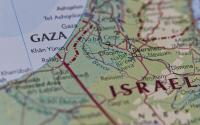Published on Wednesday, May 26, 2004 by the Seattle TimesResat Kasaba |
The United States has lost its ability to achieve its goals in Iraq. The American administration no longer has any moral standing among the people there. The longer U.S. military and civilian personnel stay involved in Iraq, the more enemies they make. Their presence taints an ever-growing circle of people who come into contact and work with the United States. These people lose the prospect of playing any role in the post-occupation Iraq, and worse, they become targets for assassination. The only clear way out of this situation is for the United States to leave Iraq as soon as possible. This departure should involve not just an end to Paul Bremer's administration and its replacement with a large embassy that will continue to wield immense power through 138,000 troops that will remain in Iraq. This should be a complete evacuation, and should usher in a period where the damage of not only Saddam Hussein's dictatorship but also of the last year can be repaired. Only then can Iraq move toward a free and democratic future, which it most certainly deserves. There is a way in which this transition can be carried out so that it does not lead to chaos and anarchy. As the very first step, President Bush should convene a summit that includes the secretary general of the United Nations and the leaders of major European powers, neighbors of Iraq (including Iran), Egypt, China and Japan. Such an extraordinary gathering would serve two purposes. One, the United States would be announcing to the world that it is changing course and reaching out to the world community in dealing with the situation in Iraq. Second, such a gathering would draw attention to the fact that if Iraq fell into anarchy and civil war, this would have serious consequences for not only the security and stability of the region but also for the world at large. In other words, those who would be most directly and immediately affected by Iraq's further slide into chaos would be invited to help prevent it. A key goal of such a summit would be to create a truly international military force to help Iraq with its security. This force should be under the command of a U.N. officer. As soon as this force is constituted, all the U.S. troops would be withdrawn from Iraq. A small number could be reintroduced subsequently but only as part of the multinational force, and under the command of the U.N. officers. The sole task of the yet-to-be-determined political structure that is scheduled to take over Iraq on June 30 should be to carry the country to national elections within the shortest time possible. Contrary to the pontifications of pundits and other "experts," the Middle East has a long tradition of electoral politics going back to the 1840s. Given the opportunity, Iraqis would certainly be capable of organizing themselves and determining their future in free elections. Such an approach would give a set of clear goals around which a very large part of the Iraqi population could unite. This would be the most effective way of isolating and marginalizing the heavily armed militias and terrorist groups that are now the biggest threat to the future of Iraq. The five points Bush listed in his speech Monday amount to little more than a restatement of general goals few people would disagree with. We still don't know how these goals are supposed to be achieved and what June 30 will bring to the country or the region. This is the perfect environment for the continuing growth of the militias, which will certainly lead to an all-out civil war. Leaving Iraq as I've suggested should not be seen as a defeat. By reassuming moral leadership and regaining its international legitimacy, the United States would find itself in a much better position to affect the international system. This is a much better route than the one we are embarked on now, where countless lives and reputations are being wasted and the country's treasure is being spent for a cause no one is able to articulate anymore. Resat Kasaba is a professor in the Jackson School of International Studies at the University of Washington. His books include "Rules and Rights in the Middle East" and "Rethinking Modernity and National Identity in Turkey." |
http://www.commondreams.org/cgi-bin/print.cgi?file=/views04/0526-10.htm






